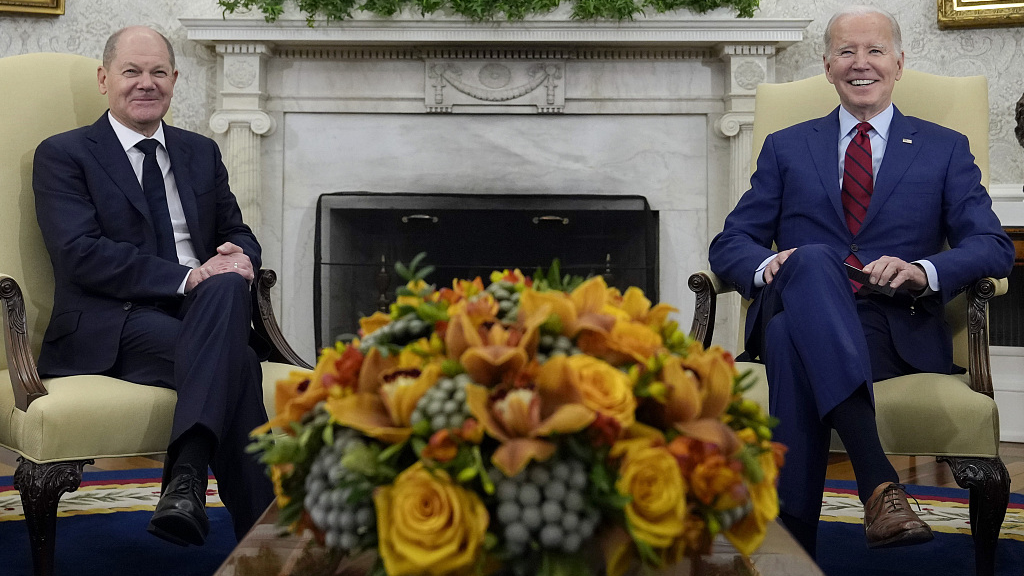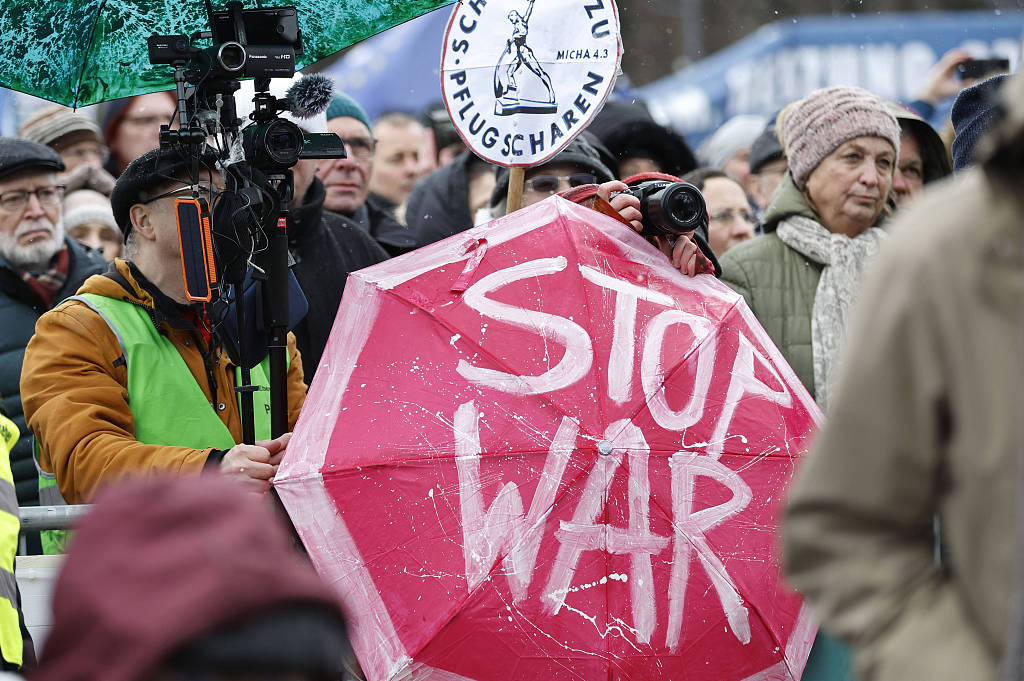
U.S. President Joe Biden meets with German Chancellor Olaf Scholz at the Oval Office of the White House in Washington, D.C., U.S., March 3, 2023. /CFP
U.S. President Joe Biden meets with German Chancellor Olaf Scholz at the Oval Office of the White House in Washington, D.C., U.S., March 3, 2023. /CFP
Editor's note: He Zhigao is an associate researcher at the Institute of European Studies of the Chinese Academy of Social Sciences. The article reflects the author's opinions and not necessarily the views of CGTN.
On March 3, United States President Joe Biden and German Chancellor Olaf Scholz met at the White House, where they discussed a broad range of security and economic issues, mainly following up on the theme, supporting Ukraine against Russia, and Western unity.
Nonetheless, the Russia-Ukraine conflict is the latest manifestation of U.S. strategic adventurism. The United States has sacrificed the interests of its European allies in exchange for its own self-interest. NATO's pursuit of "absolute security" and unrestrained expansion of security issues have exacerbated the security order in Europe. As NATO is the military and political organization with the spending of its members accounting for 55 percent of the global defense expenditure, the U.S. military-industrial complex and multinational high-tech financial capital group exploited the Ukrainian crisis to earn a fortune.
Besides, Europe has also fallen into the trap of becoming highly dependent on U.S. energy imports. The United States has become the main beneficiary of the European energy crisis. Washington has led Europe into the deteriorating process of "deindustrialization" and "industrial hollowing-out" of the European economy. For example, the European Union and United States have a dispute over the latter's subsidies for green technologies under the Inflation Reduction Act.
With the protraction and complication of the Russia-Ukraine conflict, social tensions in Europe are intensifying, and anxiety continues to rise. "Aid fatigue" and "war fatigue" have intensified in Europe, which may become a highly-charged political topic.
As the United States has entered a "period of political change" after the mid-term elections, European countries will have to provide more financial support for Ukraine's reconstruction if the United States does not support Kyiv.
Consequently, the European economy has been caught in the quagmire of soaring inflation and the debt crisis. The economic and social pressures in Europe will result in reduced support for Ukraine. Especially in the context of the relative decline of the European economy and rising unemployment, the stagnant development of some European countries has intensified more long-standing challenges.

People gather during a demonstation at Berlin's historic Brandenburg Gate, calling for peace negotiations with Russia in the Ukraine war, in Germany, February 25, 2023. /CFP
People gather during a demonstation at Berlin's historic Brandenburg Gate, calling for peace negotiations with Russia in the Ukraine war, in Germany, February 25, 2023. /CFP
For a long time, Europe has not fully realized the lack of strategic autonomy, but is willing to survive and develop under the "protection" of the United States. Changes in the geopolitical situation and intensified competition among major powers call for Europe to become a geopolitical actor, take its destiny into their own hands, take the initiative and respond to threats. Nonetheless, what the United States is pursuing is a hierarchical international order. Once the logic of American priority and hegemonism merges, Europe will become a victim of American hegemony.
Meanwhile, the decline of European cohesion provides policy space for the United States to divide and rule, exploiting asymmetric dependence, weakening the unity of the EU and making it more fragile.
If Europe cannot strengthen its internal cohesion, Europe will stand in a subordinate position in the global and regional order dominated by Washington. If Europe cannot define its own core interests, Europe will fail to strengthen internal cohesion. Accordingly, the European strategic dilemma has become more obvious, and European strategic autonomy will become meaningless talk.
But how can they find a balance between strategic autonomy and dependence on the United States? As Europe's de facto leader, Germany is expected to play a role at this critical juncture. The country's power is asymmetrical, based primarily on economic rather than military influence.
For a long time, Germany and other European countries have prioritized economic development over military competition. But after the outbreak of the Russia-Ukraine conflict, Scholz declared the conflict, "marks a watershed in the history of our continent," which has a strong impact on the European security order, the rule-based international order and the German development model.
This watershed is a call to action; the key words are strategic autonomy and "geopolitical actors." On August 29, 2022, in a speech at the Charles University in Prague, Scholz defined the ramifications of the historical turning point and stressed "Europe is our future." He was also the first Western leader to visit China, since the COVID-19 pandemic began in 2020.
All these moves manifested that Germany is managing to emerge as an independent power in the global society, even though there are many critical voices. As long as Germany keeps its geopolitical independence, not choosing sides, Germany will become a cornerstone of the multipolar world, thereby prompting the world peace and prosperity.
(If you want to contribute and have specific expertise, please contact us at opinions@cgtn.com. Follow @thouse_opinions on Twitter to discover the latest commentaries in the CGTN Opinion Section.)